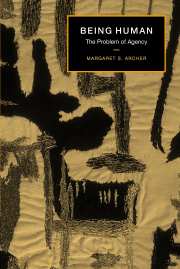Introduction
Published online by Cambridge University Press: 22 September 2009
Summary
Twelve years ago, the idea of writing a book about human agency did not strike me as a defensive project. After all, the ‘problem of structure and agency’ was widely acknowledged to lie at the heart of social theorising. This could only be the case if there were a difficulty about how to link two sets of properties and powers; those belonging to the parts of society and those belonging to the people. Certainly, as I examined this linkage, first for culture (Culture and Agency, Cambridge University Press, 1988), and then for the structure (Realist Social Theory: the Morphogenetic Approach, 1995), it was very clear that some short cuts were being taken. These I called forms of ‘conflation’. They were strong tendencies, rooted in classical sociology, either to let the ‘parts’ dominate the ‘people’ (downwards conflation), or alternatively, to allow the ‘people’ to orchestrate the ‘parts’ (upwards conflation). However, in terms of the philosophy of social science, these two fallacies were embedded in the old debate between Methodological Holism and Methodological Individualism, which thankfully seemed to be largely defunct. Indeed, it appeared to have been superseded by a new debate between Structuration Theorists and Social Realists. Despite their undoubted antinomy, the central task of both was to advance a framework which linked ‘structure and agency’.
- Type
- Chapter
- Information
- Being HumanThe Problem of Agency, pp. 1 - 14Publisher: Cambridge University PressPrint publication year: 2000
- 4
- Cited by



